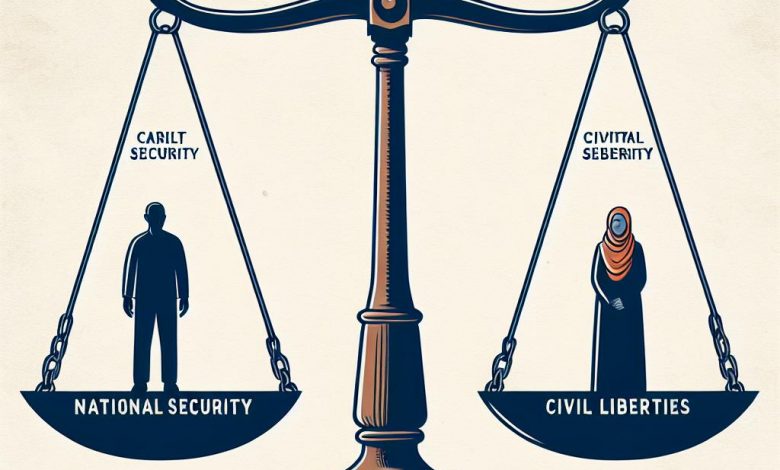
Table of Contents
Introduction to Legislative Proposals for Surveillance
In recent developments, US lawmakers have been considering legislative measures that would bring about significant changes to the current surveillance practices, particularly affecting individuals applying for immigration benefits to the United States. This proposal focuses on expanding the application of Section 702 of the Foreign Intelligence Surveillance Act (FISA), heightening surveillance methods that have already been under scrutiny for their broad reach and privacy implications.
Proposal to expand Section 702 surveillance to immigrants, asylees, and certain visa applicants
Legislation currently under consideration in Congress aims to extend the surveillance capabilities of Section 702 to cover a new demographic: those individuals applying for green cards, asylum, and some categories of visas. Section 702 has traditionally been a tool for gathering foreign intelligence, granting U.S. agencies the power to access and monitor the communications of non-U.S. persons believed to be outside the United States, without the need for individual warrants.
However, the proposed legislative changes signal a shift. They would allow these same sweeping surveillance tools to be directed at immigrants, asylum seekers, and even those with various nonimmigrant visas. Such a transition in policy reflects Congress's growing interest in employing stricter vetting processes at the U.S. border, potentially affecting millions who seek entry into the country for diverse reasons ranging from family reunification to educational opportunities.
Bipartisan support in Congress for intensified border vetting procedures
The push to enhance border vetting procedures has garnered bipartisan support within Congress. Notably, key members from both the Senate and House Intelligence Committees are advocating for the use of Section 702 surveillance powers to screen individuals attempting to enter the United States. The bipartisan backing suggests a political readiness to prioritize national security interests over privacy concerns, despite the growing mistrust and controversies surrounding the previous applications of Section 702.
Section 702 allows US agencies to wiretap foreigners’ communications without a warrant
Central to these legislative discussions is Section 702, which authorizes U.S. intelligence agencies to conduct surveillance of non-U.S. persons located outside the country without a warrant. Section 702 surveillance is broad in scope, allowing for the collection of vast quantities of electronic communications that transverse U.S. telecommunication systems. This means that phone calls, emails, and text messages can be intercepted on the presumption that they might contain foreign intelligence information. There is a particular concern that such surveillance ensnares not just the intended foreign targets but also the communications of U.S. persons who communicate with them.
Though presented as a tool for national defense and counterterrorism, the data collected can be intensely personal, revealing intimate details about individuals' lives. This has led to forceful arguments from privacy advocates and civil liberties groups who fear the implications for both Americans and foreigners alike, as those caught up in the surveilling net often include families, legal advisors, and other contacts in the U.S. without any suspicion of wrongdoing.
Details and Implications of Section 702 Expansion
The legislative initiatives propelled by the House and Senate Intelligence Committees seek not only to extend the life span of the Section 702 program, which is due to expire, but also to broaden its scope significantly by encompassing immigrants, particularly those applying for green cards, asylum, and some visas. This initiative would mean the extended reach of surveillance against non-nationals without prior suspicion or the need for a warrant, a move seen by some as an overreach and by others as a necessary step for ensuring national security.
House and Senate Intelligence Committees’ endorsement of expanded vetting
Both intelligence committees in Congress have formally endorsed the proposal to utilize the Section 702 surveillance program for expanded vetting procedures. This bipartisan venture is an indication of certain Congressional leaders' conviction that the electronic surveillance capabilities bestowed by Section 702 should play a role in scrutinizing individuals before they enter the United States. The specifics of the proposals were outlined in a memo released by the House Intelligence Committee, which specified that the bill is designed to include stringent measures for vetting immigrants, akin to those suspected of terrorism or espionage.
Despite the anticipation surrounding the House bill, it is noteworthy that the text is not yet public, keeping some elements of the proposed changes under wraps. However, the information currently available indicates a marked change that could affect millions residing or seeking to reside lawfully in the U.S, which has raised alarms about the potential impact on privacy rights and civil liberties.
Claims of necessity for national security by US intelligence leaders
Supporters of the reauthorization and expansion of the Section 702 program argue that these measures are fundamental to national security. Leaders within the U.S. intelligence community, including FBI Director Christopher Wray, have openly contended that the diminishment or discontinuation of the Section 702 program could pose substantial risks. The program is believed to play a crucial role in the ability of the government to monitor and counteract threats starting from foreign terrorist operatives to cyberattacks targeting vital U.S. infrastructures.
The depth and breadth of data that Section 702 is capable of collecting is often portrayed as essential but imponderable, with U.S. intelligence agencies claiming that quantifying how often Americans are surveilled would compromise the procedures that aim to uphold constitutional standards. This underscores the complex balance between security measures and constitutional rights, which is at the center of the current legislative debate.
Potential chilling effect on speech and privacy concerns
Privacy and civil liberties advocates emphasize that the use of Section 702 has the potential to create a 'chilling effect' on freedom of speech and privacy, particularly when such surveillance could inadvertently affect U.S. residents. The interception of interactions that are deeply personal between family members, friends, and professionals may have profound implications for privacy rights. This is a concern backed by reports from entities like the Privacy and Civil Liberties Oversight Board, which caution against the deep insights that can be unwittingly revealed about an individual's life, movements, and associations through unrestricted surveillance.
Apart from the aforementioned generalized surveillance, the expanded vetting proposed by the intelligence committees could disproportionately impact immigrant communities, putting them under closer and arguably unwarranted scrutiny, targeting their communications without any foundational suspicion. Critics have also highlighted the existing backlog and lengthy delays in the U.S. immigration system, arguing that expanded surveillance could further burden an already strained system, rather than streamline and improve it, thus exacerbating vulnerabilities and delays for those seeking asylum or immigration benefits.
Opposition from Civil Liberties and Immigrant Rights Groups
In reaction to the proposed legislative changes to Section 702, civil liberties organizations such as the American Civil Liberties Union (ACLU) as well as various immigrant advocacy groups have raised significant objections. They contend that the program’s expansion into the realm of vetting newcomers to the United States would inaugurate an era of essentially suspicionless searches that infringe on the privacy of individuals seeking refuge, opportunity, and reunion with family in the States.
ACLU and immigrant advocacy groups argue against suspicionless searches
The ACLU has been vocal in its criticism of these developments, insisting that the Section 702 program—which it claims invariably intercepts communications between foreign nationals and their family members in the U.S.—should not be used as a vetting tool. This is because such utilization extends the spheres of surveillance to include people who are not suspects and who have legitimate reasons to communicate across borders. Senior policy counsel at the ACLU have highlighted the excessively broad nature of these proposed searches and the potential overreach in surveilling individuals without any founded suspicion of wrongdoing.
Claims that expansion would further burden the already strained immigration system
Critics also express concern over the potentially deleterious effects such surveillance expansion could have on an immigration system that is already considered overburdened and ineffective. With the U.S. immigration courts dealing with backlogs amounting to millions of cases and with cases taking years to resolve, the argument goes that additional vetting protocols could exacerbate these wait times. These waits have real human costs, as they affect vulnerable populations—including families and children—seeking protections like asylum, as well as causing delays in the removal process for those without valid claims to remain in the U.S.
Accusations of systemic racism and betrayal by politicians supporting the surveillance expansion
Amidst the controversy, there are accusations that the support for such surveillance measures, particularly from democrat politicians, equates to systemic racism and a betrayal of various minority communities, including the Latino and Asian American populations. These communities, which often maintain profound international ties, stand to be disproportionately affected by any measures that expand the government's surveillance abilities. Advocacy groups argue that the expansion could imperil the very individuals it is arguably intended to protect, further marginalizing communities already vulnerable to systemic inequities.
In the spectrum of opposition, there is a call for politicians to dismantle systemic barriers and prejudices rather than reinforce policies leaving certain populations exposed and defenseless. The Asian Americans Advancing Justice (AAJC) has stressed the historical narrative of unfair treatment meted out to Asian Americans and Asian immigrants, positing that the bill's measures would be a continuation of these injustices. In essence, the opposition articulates a strong collective sentiment that national security should not be ensured at the cost of the fundamental rights and liberties of individuals, particularly those of immigrant communities.
Expected Legislative Movement and Contrast in House Bills
As Congress grapples with the impending expiration of the Section 702 program, the legislative landscape is setting the stage for contrasting approaches within the U.S. House of Representatives. With the House Intelligence Committee's bill still shrouded in some secrecy, anticipation grows over the specifics of its introduction and the legislative duel it is expected to have with another bipartisan proposal, adding to the intrigue of the Capitol Hill dynamics.
Anticipation of the House bill’s introduction and competition with another bipartisan bill
Senior congressional sources have alluded to the potential unveiling of the House Intelligence Committee's bill, backed by Chair Mike Turner and Ranking Member Jim Himes. This legislation, aimed at extending Section 702 surveillance to include immigrants and visa applicants among its targets, may emerge soon and is set to compete with a contrasting bipartisan bill from the House Judiciary Committee. The bill from the Judiciary Committee holds the potential for starkly different provisions related to privacy protections, setting the scene for a legislative tussle over surveillance powers and the balance between national security and civil liberties.
Representative Jim Jordan’s endorsement of privacy reforms in opposition to surveillance expansion
Adding to the complexity of the legislative discourse, Representative Jim Jordan, chair of the House Judiciary Committee and a vocal critic of surveillance abuse, has previously championed an array of privacy reforms. These reforms include measures such as requiring the FBI to obtain a warrant before searching through Americans' communications data collected under Section 702, a stance directly at odds with the intelligence committees’ proposed methods of data handling. Jordan’s advocacy for stringent privacy measures is indicative of the values held by some steadfast privacy advocates within the legislative body.
Uncertainty over House Speaker Mike Johnson’s stance and the influence of intelligence community appeals
The role of newly appointed House Speaker Mike Johnson remains ambiguous within this legislative puzzle. Speculated to be conducting discussions about the possibility of attaching the Section 702 program’s extension to essential legislation such as the National Defense Authorization Act, Johnson’s ultimate position could be decisive. Historical patterns suggest that the intelligence community's appeals for maintaining and even strengthening surveillance authority often hold sway with House leadership, hinting at the formidable challenge faced by privacy reform proponents. Johnson's forthcoming decisions will likely reverberate through the Congress as it confronts the critical question of how to navigate the intersection of surveillance, security, and civil rights.




